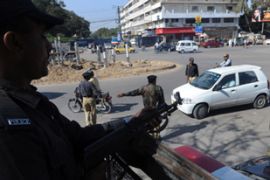Pakistan seeks better US ties
Talks in Washington to focus on increased military aid and nuclear co-operation.

On the security front, the US is considering ways to improve Pakistan’s ability to fight pro-Taliban and al-Qaeda forces along its border with Afghanistan.
Drone request
According to a senior defence official, who spoke to news agencies on condition of anonymity, Islamabad could be supplied with some unmanned drones for surveillance and intelligence gathering.
| in depth | |||||||||||
|
The official said that they were unlikely to be equipped to carry missiles.
Although it does not confirm such attacks, the US military and CIA spy agency are believed to have used the drones to carry out more than 90 drone raids in Pakistan since August 2008, killing more than 830 people, according to local sources.
US officials say they have killed senior al-Qaeda and Taliban fighters in the attacks, but the Pakistani government wants more control over military operations in its own country.
Geoff Morrell, the US defence department spokesman, said that Washington was looking at ways to expedite payments to Pakistan to reiumburse it for operations against pro-Taliban and al-Qaeda targets.
Pakistan says it is owed nearly $2bn in such payments.
Also of interest is whether the US can do more to provide protective equipment to Pakistani forces.
“We clearly recognise the incredible sacrifice that’s been made,” Morrell said, saying that some 2,700 Pakistani troops died last year in the tribal areas along the Afghanistan border.
Nuclear deal
Pakistani officials have also made it clear they would like a similar nuclear co-operation deal granted to neighbouring India by the previous US administration.
|
“We can’t just wave that magic wand and say we’ve eliminated the trust deficit. This takes time, and we have to build it step by step” Hillary Clinton, |
“We want greater co-operation to meet our future energy needs,” Salman Bashir, Pakistan’s foreign secretary, said.
“India, Pakistan, we have been in this together in South Asia, in many ways. What is good for India, should be good for Pakistan,” he said.
However, when asked whether this was something the US also wanted to pursue, Clinton said that India’s arrangement came after “many, many years” of dialogue.
“I think on the energy issue specifically, there are more immediate steps that can be taken that have to help with the grid, have to help with other sources of energy, to upgrade power plants,” she told Pakistan’s Express TV.
Kamal Matinuddin, a nuclear and security analyst in Islamabad, told Al Jazeera he did not see a nuclear deal with the US being made.
“The nuclear issue is not so much about Pakistan being recognised as nuclear power … it wants a nuclear deal for peaceful purposes because it is an energy deficient country,” Matinuddin said.
“Even if a deal is made, it would take many years [to implement]. It took five years for India to get the nuclear deal, similarly Pakistan would have to wait for another 5-7 years for them [US] to even accept Pakistan’s point of view [on this].”
Washington is also cautious due to an the controversy created by allegations that Abdul Qadeer Khan, a Pakistani scientist, transferred nuclear secrets to Iraq and Iran.
Partnership
The major focus, officials on both sides said, was to create a partnership between two nations whose relations have been marred by decades of mistrust and suspicion.
“Everybody talks about the anti-Americanism in Pakistan. It would not have been there if the United States had been seen by the people of Pakistan as a consistent and reliable partner,” Husain Haqqani, Pakistan’s ambassador to the US, said.
Clinton told Pakistan’s Dunya TV on the eve of the talks: “We want to take our relationship to a deeper level.
“We can’t just wave that magic wand and say we’ve eliminated the trust deficit. This takes time, and we have to build it step by step,” she said.
Qureshi said their relationship had improved in recent months following the arrest by Pakistan of key Afghan Taliban leaders including Mullah Abdul Ghani Baradar, the Afghan Taliban’s second-in-command – which garnered praise from the US.
“We are ready to deliver,” Qureshi said.
On Tuesday Qureshi and Kayani met with senators John Kerry and Richard Lugar, who authored last year’s bill that promised $7.5bn dollars in aid over five years to build Pakistan’s infrastructure and democratic institutions.
